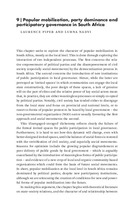Popular mobilisation, party dominance and participatory governance in South Africa
Abstract
This chapter seeks to explore the character of popular mobilization in
South Africa, mostly at the local level. This is done through exploring the
interaction of two independent processes. The first concerns the relative
empowerment of political parties and the disempowerment of civil
society (especially social movements) by the democratization process in
South Africa. The second concerns the introduction of new institutions
of public participation in local governance. Hence, while the latter are
portrayed as ‘invited spaces’ in which communities can engage the local
state constructively, the poor design of these spaces, a lack of genuine
will on the part of elites and the relative power of key social actors mean
that, in practice, they are either meaningless processes or simply co-opted
by political parties. Notably, civil society has tended either to disengage
from the local state and focus on provincial and national levels, or to
resort to forms of popular protest to be heard by local government – the
non-governmental organization (NGO) sector usually favouring the first
approach and social movements the second.

